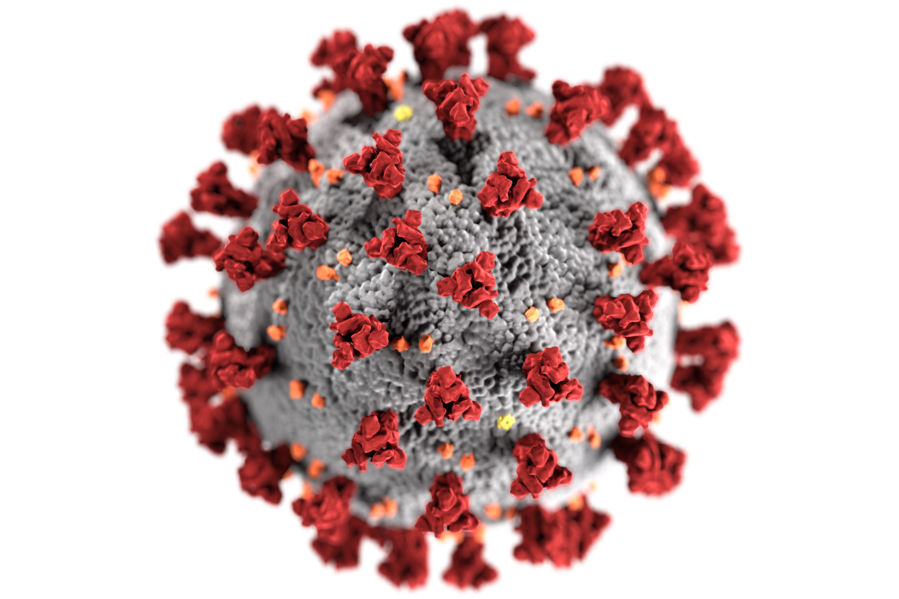Letter to the Editor: Forming Campus Allies for College Students to Resist Coronavirus-Fueled Racism
Illustration of the morphology of the coronavirus from the Centers of the Disease Control and Prevention (Courtesy Wikimedia Commons)
April 18, 2020
The views expressed in this letter are not from a writer at the Daily Utah Chronicle and do not express the views of the opinion desk or the Chronicle as a whole.
Since the new coronavirus outbreak has emerged, outbreaks of anti-Asian bullying and harassment have frequently occurred. Ivana Martinez’s article “Coronavirus Outbreak Fuels Xenophobia” exemplified the racist sentiments that target Chinese people and Asians in the United States. These sentiments have also spread on social media networks. For example, on Feb. 13, Chuck Woolery posted on Twitter “China wouldn’t care about killing their own people” with a series of follow up comments including “they definitely don’t care about killing their animals” and “their citizens are nothing more than their slaves.”
Recognition of this racism has even appeared on Wikipedia, which has provided information about the increased xenophobia, prejudice and racism against Chinese and other Asian groups throughout the globe. A large number of anti-Asian racist incidents have taken place in multiple countries since the COVID-19 outbreak — which has led to racist terminology such as “Yellow Peril” and “China Virus.”
This phenomenon had resulted in many reports from Asian Americans and international students about incidents of hostility and bias in the community and at school. On Feb. 18, NBC News published an article on students’ complaints about “colleges not doing enough to combat coronavirus-fueled racism.” Students expressed their hope and urgent need to see their schools providing further support for affected students, including increasing campus counseling.
The U.S. education system is often viewed as the ideal institution to realize the “American dream” by many international and immigrant students. These places, however, are also sites of stratification that reinforce society’s inequalities. “Anti-Asian” stereotypes and racial profiling have a detrimental impact on the educational experiences of Chinese international students, Chinese and other Asian Americans. Being mistreated, distanced and isolated on campuses result in emotional and psychological trauma. Therefore, it is important for educational institutions to be aware of and immediately address the anti-Chinese and anti-Asian messages at an institutional level. School administrators, faculty, staff and students are essential allies to ensure that anti-Chinese rhetoric doesn’t turn into violent acts against these students.
At the University of Utah, an analysis of student visa data suggests that in 2018 as many as 368,073 Chinese students came to study in U.S. colleges and universities and the U was home to approximately 828 of these Chinese students. On Feb. 17, the Chinese Students and Scholars Association at the University of Utah posted on their Wechat public account about the process to report coronavirus-related racism on campus and ways for Chinese International students to seek support. The account listed resources including Resident Advisors, the Office for Health Equity and Inclusion, incident report through U housing and the CSSAUU.
CSSAUU also states that if you want to know more about coronavirus, you should go to the U search engine, which directs you to the university’s search engine with coronavirus in the search.
Even though CSSAUU has been proactive in providing resources for students to report anti-Asian racist experiences and how to seek counseling services on Wechat, their official website doesn’t show any information about China’s coronavirus. Only Chinese students who have an individual Wechat account and have a CSSAUU public account would be able to access information about the various resources. Meanwhile, many Asian international students and Asian Americans are experiencing discrimination and racial stereotyping and thus need immediate help from all campus allies. All information and sources shared in a larger scale would make a difference in these students’ lives.
There is a need for the institutions of higher education, like the U, to explicitly confront cases of xenophobia before all students through collaboration and partnerships among school administrators, faculty, staff and student organizations. We need to actively build community networks across boundaries of race and ethnicity through collaborative acts in order to provide support and resources for our students who are dealing with various forms of oppression. There is also a need to organize critical conversations on social justice, diversity and equity to foster individual and group sharing in order to thrive as an educational institution.
— Nuo Xu, University of Utah Student
Editor’s note: Signs and symptoms of COVID-19 include fever, dry cough, tiredness, and shortness of breath. These symptoms are believed to occur between 2 and 14 days after a person is exposed to the disease. If you have these symptoms and have recently come into contact with a person who is known to have COVID-19, or if you have recently traveled to an area with community spread of the disease, you should call your doctor. Areas with community spread of COVID-19 are believed to include China, South Korea, Italy, Iran, and Seattle. If you do not have a doctor who you visit regularly, please call the Utah Coronavirus Information Line at 1-800-456-7707 or the University of Utah Health hotline at 801-587-0712. Do not go to a healthcare facility without first making arrangements to do so.







